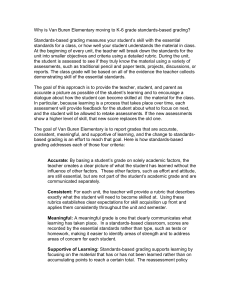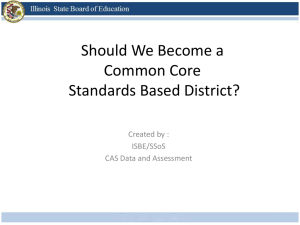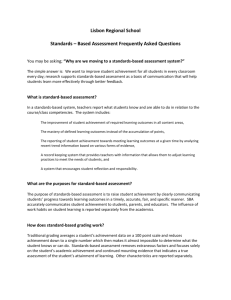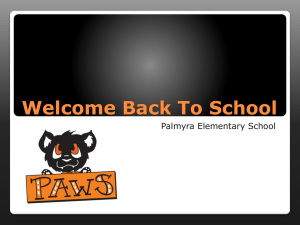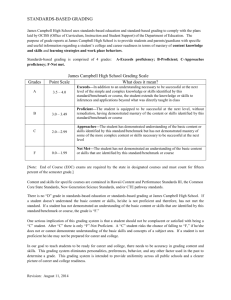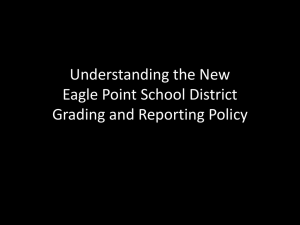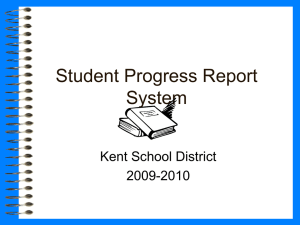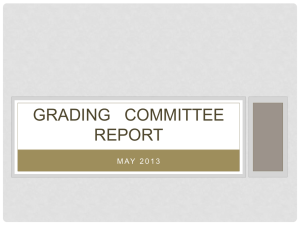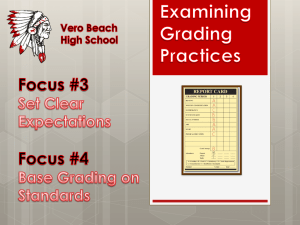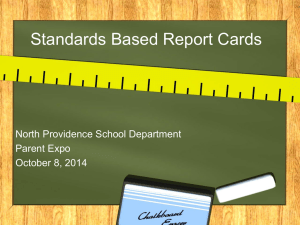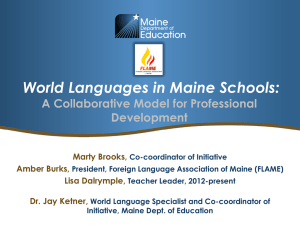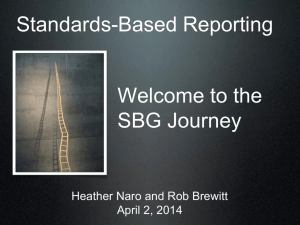Standards-based Grading and Reporting
advertisement
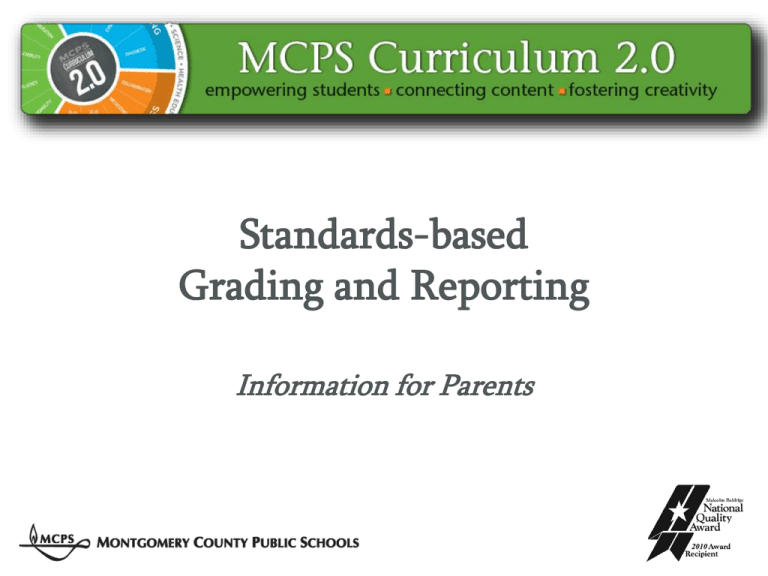
Standards-based Grading and Reporting Information for Parents Our discussion will address— • standards-based grading and reporting • the rationale for implementing standards-based grading and reporting in MCPS • the alignment between Curriculum 2.0 and standards-based grading and reporting • components of the Curriculum 2.0 report card What is Standards-based Grading and Reporting and Why are We Implementing It? What is standards-based grading and reporting? It is a comprehensive system that: • aligns instruction and assessment to standards • aligns grades to standards Why are we implementing standardsbased grading and reporting? Standards-based teaching and learning: • links instruction and grading to standards • provides an accurate reflection of what students know and are able to do • increases student achievement How are Curriculum 2.0 and Standards-based Grading and Reporting Aligned? Curriculum 2.0 Instructional Cycle Identifying Learning Goals Curriculum 2.0 Organization Measurement Topics • Related learning goals are organized into Measurement Topics. • Each content in Curriculum 2.0 contains two or more Measurement Topics. Measurement Topics Measurement Topics in: Math Reading Writing align with Common Core State Standards Measurement Topics in: Science Social Studies align with Art Music Physical Education Measurement Topics in: ESOL align with Maryland State Curriculum World-Class Instructional Design and Assessment Curriculum 2.0 Measurement Topics Earth and Space Science Science Engineering and Technology Life Science Physical Science Parent’s Guide to Curriculum 2013–2014 Plan Instruction Proficiency Statements • Every Measurement Topic has a corresponding proficiency statement. • A proficiency statement provides clarity on what students should know or be able to do by the end of the year within a Measurement Topic. Proficiency Statement Science, Grade 5 Engineering and Technology Students demonstrate proficiency of Grade 5 standards for this measurement topic by: • Understanding Explanations- Explaining relationships among technology, humans, and the natural world. Understanding the engineering design process and its application to real-world situations. • Generating Evidence- Deciding what evidence is needed to investigate a scientific question or address a technological problem. Applying the engineering design process to address a technological problem. • Reflecting on Knowledge- Using and interpreting scientific and technological knowledge to revise thinking based on new evidence or ideas about products or systems. • Participating Productively- Representing information and ideas clearly and convincingly based on scientific evidence and technological concepts or designs. Instruct, Assess, and Provide Feedback REPORT student achievement Grading Student Understanding Levels of Performance Instruction begins at the grade-level standard. How the student performs at the grade-level standard determines level of proficiency. Exceptional (ES) Exceptional at the grade-level standard. Instruction on the Measurement Topic Meets the grade-level standard by demonstrating proficiency of the content or processes for the measurement topic. In progress (I) In progress toward meeting the grade-level standard. Not yet or minimal (N) Not yet making progress or making minimal progress toward meeting the grade-level standard. How the student responds Proficient (P) Reporting Student Achievement REPORT student achievement IDENTIFY learning goals PLAN for instruction based on student need GRADE based on evidence of learning INSTRUCT, ASSESS, PROVIDE FEEDBACK to student What are the Components of the Curriculum 2.0 Report Card? Standards-based Report Card Subject Standards-Based Report Card Science (Grade 5) P ES I P P P P P Reporting the Reading Level Kindergarten, Grade 1, and Grade 2 Reporting the Reading Level Grade 3, Grade 4, and Grade 5 Math Enrichment/Acceleration Learning Skills Kindergarten Personal and Social Development • Follows classroom rules and routines • Rules and Procedures • Interacts easily with peers • Task Completion • Shows initiative and self-direction • Uses classroom materials appropriately Kindergarten – Grade 5 Thinking and Academic Success Skills Grades 1 – 5 Work Habits • • • • • • • • • • • Analysis Collaboration Effort/Motivation/Persistence Elaboration Evaluation Flexibility Fluency Intellectual Risk Taking Metacognition Originality Synthesis Learning Skills: Codes Code Description DEM Demonstrating PRG Progressing N Not yet evident Questions? Additional Information • Your child’s teachers • School principal • A Parent’s Guide to Curriculum 2013-2014 http://www.montgomeryschoolsmd.org/curriculum/elementary/guides.aspx • Curriculum 2.0 website: http://www.montgomeryschoolsmd.org/curriculum/2.0/
